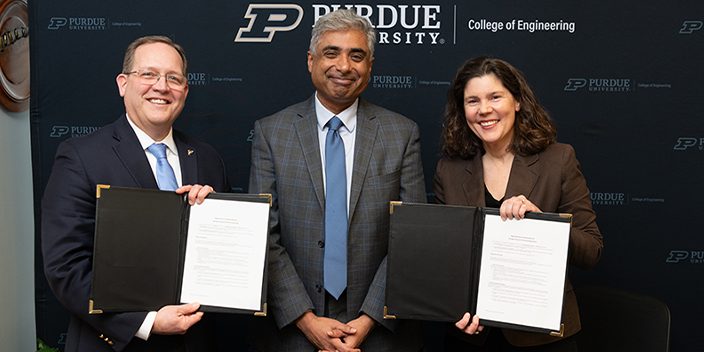Birck supports new Purdue-Dassault Systèmes partnership in developing virtual twin technology to enhance semiconductor education and research

Purdue is working to revolutionize workforce development for the semiconductor and microelectronics industry, with its latest collaboration focused on delivering virtual twin capabilities to augment and accelerate semiconductor training, research, and sustainability, as well as the development of new capabilities.
The latest step in educational excellence is marked by a new Purdue partnership with multinational software giant Dassault Systèmes, a leader in providing virtual twin experiences for global industries.
Birck Nanotechnology Center, a world-class open access nanofabrication and characterization facility, will serve as the central prototyping facility, employing cutting-edge virtual twin technology to redefine workforce training, R&D, and sustainability in the semiconductor sector.
A memorandum of understanding was signed Friday (Feb. 16) with the company as part of a campus visit and tour by Dassault Systèmes, who met with representatives from Birck, where students learn the latest semiconductor technology in preparation for joining the workforce amid high demand for skilled industry workers.
Virtual reality training on tools can help to accelerate the learning curve and expose students to the most advanced semiconductor equipment available. Virtual twin is an immersive experience that mimics the physical world such as the Scifres cleanroom at Birck as well as processing and characterization equipment housed there. Virtual twins are highly sophisticated physics-based models of their real-world counterparts that strive to encompass all the physical, operational and environmental factors and frequently update them with real world data, enabling more accurate simulation and predictive modeling.
The virtual models provided by Birck and Dassault can benefit the entire research community, enabling foundry partners to design their fabs and optimize their production processes, and allowing process engineers to benefit from the multiscale multiphysics simulation capabilities. Most importantly, this program will prepare generations of students to join the semiconductor workforce with cutting edge skills and better understanding of the fundamental principles at hand in the cleanroom. Alyssa Wilcox, Purdue’s senior vice president for partnerships and chief of staff to the president, signed the agreement with Bill DeVries, vice president for industry transformation and customer success at Dassault Systèmes and was joined by Arvind Raman, the John A. Edwardson Dean of the College of Engineering.
“This collaboration reflects Purdue’s goal to innovate and improve development opportunities for students,” Wilcox said. “Our continuing role in both workforce and research innovation underscores Purdue’s leadership in creating vital partnerships in semiconductors.”
“Within the semiconductor industry, tomorrow’s workforce will require cutting-edge skills, empowered by science-based virtual twins,” said Stephane Sireau, vice president, high-tech industry, at Dassault Systèmes and member of the Purdue Semiconductor Degrees Leadership Board. “We are proud to strengthen our existing engagement within Purdue’s growing semiconductor innovation ecosystem to ensure students receive the best learning opportunities in advanced semiconductor manufacturing.”
Through its partnership with Dassault Systèmes, Purdue will leverage modern digital manufacturing practices toward the development of students’ technological skills, educational content and training courses. These practices will instill the power of virtual twin, simulation and augmented reality developments to accelerate semiconductor design and the future of high-tech components and products.
The agreement also will facilitate a network of academia and industry partners to create new opportunities for skills development and technological expertise.
Building on long-standing collaborations, the MOU-signified partnership with Dassault Systèmes aligns with Purdue’s commitment to academic excellence and positions the university at the forefront of cutting-edge technologies, further underscoring its position as the heart of the Silicon Heartland.
The move is the latest in an ever-expanding list of global partnerships and initiatives that Purdue has forged to build the collaborative network that will define the future of semiconductor, nanoelectronics and digital technologies research and development at Purdue.
Purdue’s growing semiconductor innovation ecosystem is one of four key pillars of Purdue Computes, a comprehensive initiative across computing departments, physical AI, semiconductors, and quantum science and engineering to enable unparalleled excellence at scale.
Purdue is a national leader in microelectronics materials, devices, chip design, tool development, manufacturing, packaging and sustainability, spanning the semiconductor ecosystem in software and hardware with long-standing faculty excellence.
Strategic initiatives in semiconductors, such as the first comprehensive Semiconductor Degrees Program, announced by Purdue in 2022, are intended to prepare a next-generation workforce for industry.
Adapted from a story originally published by Purdue News.